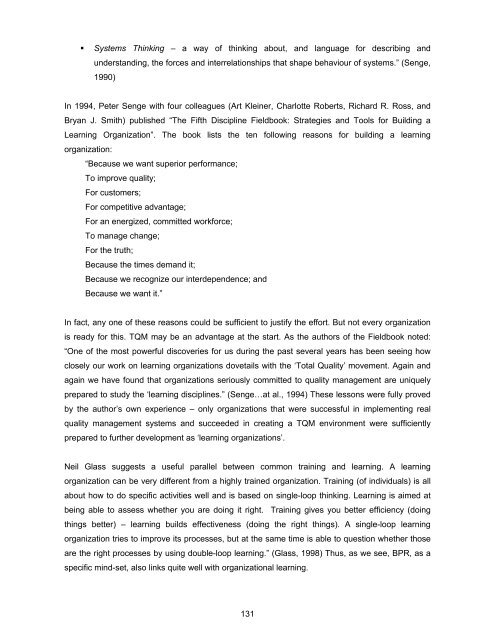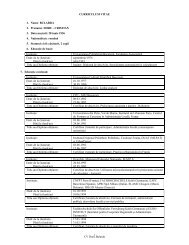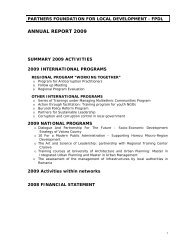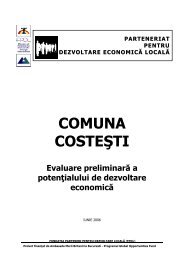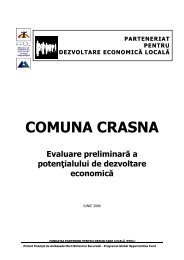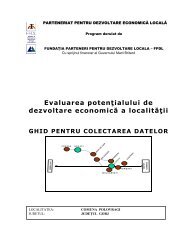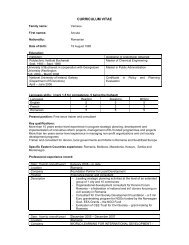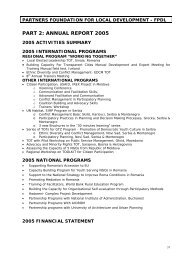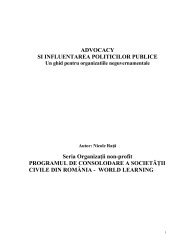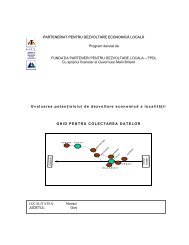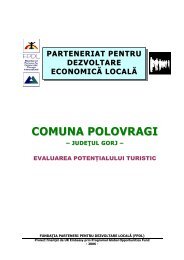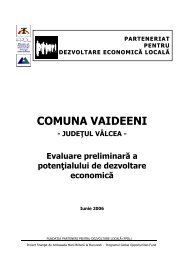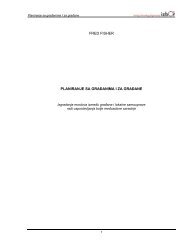Organizational Development: A Manual for Managers and ... - FPDL
Organizational Development: A Manual for Managers and ... - FPDL
Organizational Development: A Manual for Managers and ... - FPDL
Create successful ePaper yourself
Turn your PDF publications into a flip-book with our unique Google optimized e-Paper software.
• Systems Thinking – a way of thinking about, <strong>and</strong> language <strong>for</strong> describing <strong>and</strong><br />
underst<strong>and</strong>ing, the <strong>for</strong>ces <strong>and</strong> interrelationships that shape behaviour of systems.” (Senge,<br />
1990)<br />
In 1994, Peter Senge with four colleagues (Art Kleiner, Charlotte Roberts, Richard R. Ross, <strong>and</strong><br />
Bryan J. Smith) published “The Fifth Discipline Fieldbook: Strategies <strong>and</strong> Tools <strong>for</strong> Building a<br />
Learning Organization”. The book lists the ten following reasons <strong>for</strong> building a learning<br />
organization:<br />
“Because we want superior per<strong>for</strong>mance;<br />
To improve quality;<br />
For customers;<br />
For competitive advantage;<br />
For an energized, committed work<strong>for</strong>ce;<br />
To manage change;<br />
For the truth;<br />
Because the times dem<strong>and</strong> it;<br />
Because we recognize our interdependence; <strong>and</strong><br />
Because we want it.”<br />
In fact, any one of these reasons could be sufficient to justify the ef<strong>for</strong>t. But not every organization<br />
is ready <strong>for</strong> this. TQM may be an advantage at the start. As the authors of the Fieldbook noted:<br />
“One of the most powerful discoveries <strong>for</strong> us during the past several years has been seeing how<br />
closely our work on learning organizations dovetails with the ‘Total Quality’ movement. Again <strong>and</strong><br />
again we have found that organizations seriously committed to quality management are uniquely<br />
prepared to study the ‘learning disciplines.” (Senge…at al., 1994) These lessons were fully proved<br />
by the author’s own experience – only organizations that were successful in implementing real<br />
quality management systems <strong>and</strong> succeeded in creating a TQM environment were sufficiently<br />
prepared to further development as ‘learning organizations’.<br />
Neil Glass suggests a useful parallel between common training <strong>and</strong> learning. A learning<br />
organization can be very different from a highly trained organization. Training (of individuals) is all<br />
about how to do specific activities well <strong>and</strong> is based on single-loop thinking. Learning is aimed at<br />
being able to assess whether you are doing it right. Training gives you better efficiency (doing<br />
things better) – learning builds effectiveness (doing the right things). A single-loop learning<br />
organization tries to improve its processes, but at the same time is able to question whether those<br />
are the right processes by using double-loop learning.” (Glass, 1998) Thus, as we see, BPR, as a<br />
specific mind-set, also links quite well with organizational learning.<br />
131


